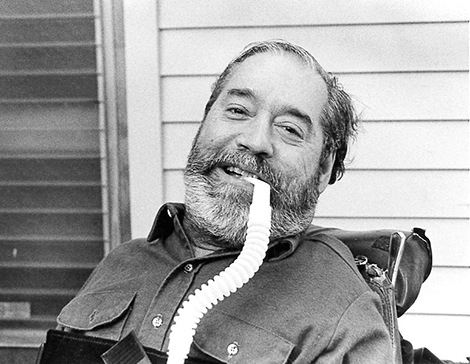 Ed Roberts was a visionary disability advocate and the “Father of Independent Living.” He began his decades-long work as a pioneering activist in 1954. His relentless commitment to advocacy left a profound legacy that continues to inspire and guide efforts for equality today.
Ed Roberts was a visionary disability advocate and the “Father of Independent Living.” He began his decades-long work as a pioneering activist in 1954. His relentless commitment to advocacy left a profound legacy that continues to inspire and guide efforts for equality today.
On January 23, the disability community celebrates Ed’s life. We honor him because his story reminds us that change often takes years, even decades. Advocacy is not easy; it demands personal commitment, perseverance, and a steadfast belief in justice.
Ed Roberts’ Early Life and Challenges
At age 14, Ed contracted polio, resulting in severe muscle and respiratory weakness. He became quadriplegic and used a wheelchair and an iron lung for support. These challenges, however, did not deter him from envisioning a world where people with disabilities could live independently and thrive.
The 1950s: Confronting Discrimination
Ed’s fight for equal access began in high school when he was denied a diploma for not completing driver’s education and physical education—a blatant act of discrimination. This early injustice fueled his determination to challenge systemic ableism and advocate for equal opportunities.
The 1960s: Leading as a Student Advocate
Ed became the first student using a wheelchair to attend the University of California, Berkeley. Recognizing a lack of resources for students with disabilities, he co-founded the Physically Disabled Students’ Program (PDSP), the world’s first student-led disability services program. Ed worked alongside other activists to secure and protect disability rights, setting the stage for broader advocacy efforts.
The 1970s: Building the Independent Living Movement
Faced with employment discrimination and societal prejudice, Ed founded the first Independent Living Center in the United States. He demonstrated that people with disabilities could not only work but also lead and shape their communities. The Independent Living Movement, which Ed championed, continues to empower people with disabilities to live, work, and thrive on their terms. His vision remains a cornerstone of modern advocacy.
The 1990s: Influencing the ADA
Ed’s contributions were pivotal in shaping the Americans with Disabilities Act (ADA), particularly its provisions on accessibility in public spaces and transportation. The ADA’s passage in 1990 stands as a testament to decades of tireless advocacy, including Ed’s enduring influence.
Honoring Decades of Advocacy
Ed Roberts Day reminds us of the enduring power of advocacy. As we celebrate his life, we must continue dismantling ableism, advocating for equal access, and creating inclusive environments. Ed’s legacy teaches us that advocacy is a long-term commitment, requiring courage, collaboration, and resilience.
At the Minnesota Council on Disability, advocacy remains at the forefront of our mission. Inspired by Ed Roberts, we strive to eliminate discrimination, ensure equal opportunities, and promote inclusive communities for all people with disabilities. Our work carries forward the momentum he created, ensuring that his vision of independence and equality continues to guide us.